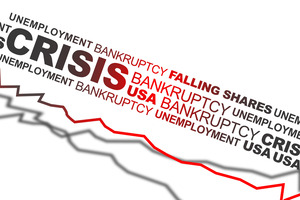
For many people, bankruptcy is the key to resolving financial problems. It’s a drastic option that can eliminate debt entirely. In other cases, it reorganizes debt and makes repaying existing debts affordable.
As effective as bankruptcy is for the majority of people who choose to file, it’s not perfect. There are instances in which bankruptcy doesn’t eliminate all someone’s financial problems. And unfortunately, problems that occur during bankruptcy can put someone’s mortgage at risk of foreclosure.
There are also instances in which situations arise after bankruptcy that put your home at risk. Depending on how recently you filed for bankruptcy, it might not be an option when new financial issues put your mortgage at risk.
If any of these scenarios apply to you, what should you do next?
Much of what happens regarding your mortgage after bankruptcy depends on timing and the chapter bankruptcy you used.
Here’s what you need to know:
Chapter 7 Bankruptcy and Mortgage
To file for Chapter 7 bankruptcy when you own a home, you must be current on your mortgage payment. You must continue to stay current on your mortgage throughout the bankruptcy if you want to keep your home.
Should you fall behind on your mortgage during the bankruptcy process, one of two things can occur:
If you fall behind on your mortgage before you receive your final decree and your bankruptcy is complete, the mortgage lender can take legal action against you. They do this by filing a Motion for Relief from the Automatic Stay. If the court approves their request, they’ll have the power to begin foreclosure proceedings.
In most cases, courts grant the Motion for Relief from Automatic Stay unless the homeowner brings their payment current by the time of the hearing.
Can a Bankruptcy Trustee Sell My Home?
In many cases, yes, a bankruptcy trustee can sell your home. More often than not, the bank will foreclose and evict you from your home. If your mortgage is paid in full, the bankruptcy trustee can sell your home and use the profits to repay creditors.
However, there are ways to protect your home. This is why it’s so important to contact an attorney as soon as possible. The sooner you act the easier it is to protect your home.
If you fall behind on your mortgage after receiving the final decree, it’s no different than if you’d never filed for bankruptcy. Your bankruptcy is complete, so the foreclosure is handled as it would’ve been before your bankruptcy.
This means the bank doesn’t need permission to move forward with foreclosure proceedings because there is no automatic stay in place.
The only difference is you can’t turn to bankruptcy now to buy time or prevent foreclosure due to the laws regarding multiple bankruptcy filings.
The best thing you can do as a homeowner as you emerge from Chapter 7 bankruptcy is to keep your payments current. Make your mortgage your number one priority among your debts and if you anticipate a financial problem, contact your mortgage lender immediately.
Chapter 13 Bankruptcy and Mortgages
Many homeowners opt for Chapter 13 bankruptcy over Chapter 7 because for many, it’s easier to protect ownership of their home. But this doesn’t mean mortgage protection is fully guaranteed. This is especially true if you fail to meet your obligations regarding your mortgage within the bankruptcy.
Again, timing is very important when it comes to foreclosure efforts during bankruptcy.
If you’re up-to-date on your mortgage payments when you file for bankruptcy, your mortgage will not be included in the bankruptcy. You’ll continue to pay as you have all along and the bankruptcy trustee will have nothing to do with your mortgage payments. It’s called “paying outside of the plan.”
If you’re behind on your mortgage payment when you file for bankruptcy, as many people are, it is included in your bankruptcy payment. Payments are made to the trustee and the trustee will distribute the money accordingly.
What happens if you’re aren’t behind when you file Chapter 13 but you fall behind?
Your mortgage is a secured debt. This means it cannot be discharged in your Chapter 13 bankruptcy. Instead, it will be added to your repayment plan. Your payment plan will increase and reflect the amount owed. If you are unable to afford the payment increase your home will be at risk of foreclosure.
Filing for bankruptcy might be the smartest decision you’ve ever made. However, this doesn’t mean it will solve all of your problems. It might just be the first step in a long process of getting your financial situation under control
Have you found yourself wondering…
- Can a bankruptcy trustee sell my home…?
- Will the bank evict me from my home…?
- How long can I go without paying my mortgage…?
It’s time to contact a bankruptcy attorney. They can help you evaluate your options and make the best decision based on your circumstance.
For more information or to schedule a consultation, contact the Law Offices of Robert M. Geller at 813-254-5696.




























![Signs That You May Need to File Bankruptcy [Infographic]](https://djml3wkzi26ea.cloudfront.net/wp-content/uploads/2021/01/signs-chap7-v-chap13.jpg)
![How To File for Bankruptcy [Infographic]](https://djml3wkzi26ea.cloudfront.net/wp-content/uploads/2020/07/bankruptcy-steps-infographic-web.jpg)










